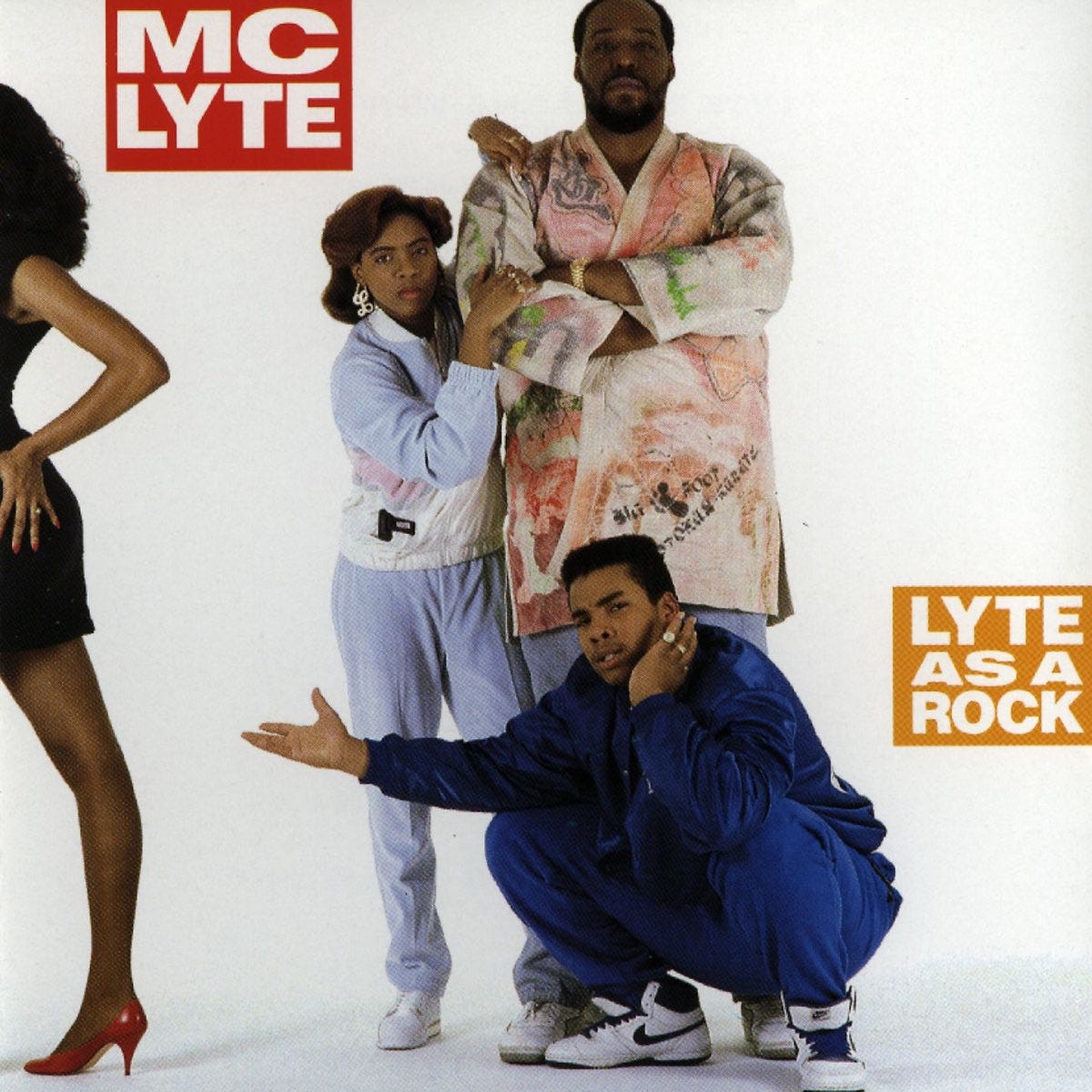Retrospective Review: Lyte as a Rock by MC Lyte
MC Lyte kicked down doors for the women with her indisputable classic debut album.
In the late 1980s, women rappers struggled to receive the recognition they deserved. Record labels hesitated to sign them, fueled by sexism and the belief that women couldn’t sell records without male endorsement. Despite this, talented artists like MC Lyte emerged and proved themselves in the male-dominated industry. MC Lyte’s debut album, Lyte as a Rock, released 35 years ago, showcased her exceptional skills and solidified her place in hip-hop history.
MC Lyte began honing her craft in the competitive New York club scene of the mid to late ‘80s. Even as a high school student, she commanded respect with her performances at renowned venues like the Latin Quarter and Union Square. At 16, her step-father, Nat Robinson, Sr., released her single “Cram to Understand U” through his First Priority label in 1986. Meanwhile, Audio Two’s “Top Billin’” started gaining popularity in clubs. Seizing the opportunity, Nat Robinson negotiated with Atlantic Records, presenting Audio Two and MC Lyte as a package deal, ultimately signing them both.
Lyte as a Rock shares the familiarities with Audio Two’s LP as it prefers stripped-down, drum-heavy production and concise track listings, clocking in at just under 40 minutes. However, Lyte as a Rock feels more like a complete album, while What More Can I Say? has the vibe of an extended EP. Furthermore, MC Lyte’s superior lyricism shines through on Lyte as a Rock, complimented by straightforward production that allows her raw raps to take center stage. Although Audio Two primarily handled the beats, other producers, such as King of Chill/The Alliance and Prince Paul, contributed their talents to the album.
Lyte’s husky voice and conversational flow combine with the neck-snapping beats to create a memorable and impactful listening experience. Despite the challenges faced by women in the industry during that era, MC Lyte proved her worth with this groundbreaking album. It served as a milestone in her career and solidified her position as one of hip-hop’s finest. Today, her contributions inspire and empower aspiring women emcees to claim their rightful place in hip-hop.
Her debut showcases her confidence in her lyrical abilities through tracks on “I Am Woman,” “Lyte Thee MC,” and “Don’t Cry Big Girls.” However, “MC Lyte Likes Swingin’” stands out with its complex production by Prince Paul. Over various horn samples, filtered vocals, scratches, and shifting drum breaks, Lyte proves why she’s the perfect party rocker.
Despite her proficiency in boasting about her skills, Lyte is not a one-dimensional artist. Her first single, “I Cram to Understand U,” tells the story of her tumultuous relationship with an ex named Sam, whom she describes as having a head like a clam. The song follows her as she uncovers Sam’s shady and erratic behavior, ultimately discovering that he’s addicted to crack cocaine. Through the solid drum track, Lyte effectively conveys the emotions one experiences when realizing that someone one loves is not who they seem. While there is some denial and acceptance, there is also much anger.
MC Lyte’s “Paper Thin,” the third single from her album, is considered one of the greatest hip-hop breakup tracks ever created. The song is a scathing attack on an ex-lover who cheated on her and took her feelings for granted. Lyte expresses her disdain for anyone who tries to analyze her thoughts and emphasizes her independence by stating that she will never use men for their money, a rarity in hip-hop songs during the ‘80s, ‘90s, and even today. The beat for “Paper Thin” was produced by King of Chill and featured a guitar solo from Prince’s “17 Days” and drums from Al Green’s “Glad You’re Mine.” Like Audio Two’s “Hickies On My Neck,” the song combines vocals and instrumentals, with Lyte’s verses followed by a dubbed-out version.
Throughout her career, MC Lyte has been known for recording diss tracks, with “10% Dis” on Lyte as a Rock being one of her most notable diss tracks aimed at rapper Antoinette. The feud began when Antoinette used a beat similar to Audio Two’s “Top Billin’” on her song “I Got an Attitude,” Lyte responded with a harsh attack on Antoinette.
MC Lyte meticulously dissects Antoinette with a calculated and disdainful approach spanning six verses. Lyte openly criticizes her adversary for emulating the production style of Audio Two and, in terms of lyrics, for imitating Rakim. It’s worth noting that Lyte later admitted to having no prior acquaintance with Antoinette and revealed that she deliberately crafted the harshest possible words for her. In Lyte’s terms, the song’s title was derived from the notion that they only utilized 10% of their generated material.
While Lyte has stated that “10% Dis” was purely a matter of business, her lyrical delivery carries a personal undertone. The feud between these two persisted through Antoinette’s two albums and Lyte’s sophomore release, Eyes On This (1989). This period saw the creation of equally unforgiving tracks like “Shut the Eff Up (Hoe)” and “Slave 2 the Rhythm.” Lyte later claimed they engaged in an onstage battle at The World, a New York club, asserting her victory.
This album marked the beginning of Lyte’s solid and successful career, effectively disproving Atlantic’s hesitance to sign her. Throughout the album, she stays true to herself, displaying defiance and confidence comparable to any other skilled emcee. This self-assuredness and exceptional talent elevate Lyte as a Rock, making it as memorable as any album from hip-hop’s early years.


